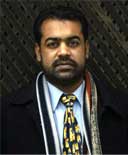Clash within Islam |
The RAND Corporation in its 2007 report, “Building Moderate Muslim Networks”, suggests that the Western interests are aligned closely with those of the Sufis. The US think-tanks advocates a bizarre idea that similar to the last sponsored religious movement based on ‘Jihad’ in Afghanistan during the cold war, the sole super power and its allies should invest in ‘Sufism’ against religious extremism.
The idea has been tested in Malaysia, Indonesia, the UK with varying degrees of results. With the formation of British-Muslim Forum, Sufi-Muslim Council and Sufi Council in Pakistan during Musharraf’s regime, the movers and shakers of the global politics fell prey to pseudo-Sufis who obviously were not capable of bringing any healthy change. On the contrary, the Muslim population at large rejected such efforts.
Sufis are not clerics. They are people of conscious and wisdom. They know, they find and they adopt the way according to the circumstances as they did in 19th century when Russians pushed south in the Muslim Lands. Legendary Imam Shamil, a Sufi sheikh, launched decades’ long guerrilla war. More recently, when an al-Qaeda-affiliate Islamic movement arose in Uzbekistan, the government’s intimate alliance with the Sufi orders allowed it to fail the insurgents effectively.
Fundamentalists realize the challenge Sufism poses to their narrow-minded hate-driven approach. For that matter, extremist forces rely on instilling fear by resorting to violence against followers of the Sufi school of thought.
Massively stereotyped and stigmatized Pakistan is a glaring example, where the Sufi current dominated the Islamic way of life until it had not become a proxy in the Afghan jihad and tug-of-war between Wahabi and Shi’ite Islam.
Faced with the worst extremist religious threat in history, the most revered Sufi shrines have been attacked time and again, with heavy toll on human lives. Still the real Sufis are sitting quite. However, religious political opportunists enjoy the media limelight for short-term petty goals. Undoubtedly, extremism could not have made inroads in Pakistani social fabric had the Sufis continued to play their due role in guiding the people. Decline of the Sufi Institution of the Khanqah, an educational and training facility at the shrines, has inflicted an irreversible loss to the society. Inherent mechanism of course correction in the backdrop of this bloody, rude awakening would revive the real spirit of Sufism for the rescue of historically non-violent people.
Sufis are ideally suited to guide the Muslim youth that quest for peace requires return to the faith’s deepest roots instead of surrendering to oppression. Sufism is the greatest hope for pluralist society and meaningful democracy. Surpassing sectarian lines and cultural superiority complexes, Sufism offers bridge for the disoriented Muslim world to embrace a truly global spiritual culture, based on love, peace and harmony rather than materialism based on greed and lust.








 Sahibzada Asim Maharvi Chishti , born in the famous Chishti Sufi family; educated in the West; a researcher, writer and columnist is the Chairman of Chishtiya Ribbat Sufi Studies Center in Pakistan. He has delivered lecture on spirituality, comparative religions, spiritual healing and history of civilizations. As chairman of Sufi Studies Center he has examined, translated and published the classical Sufi literature.
Sahibzada Asim Maharvi Chishti , born in the famous Chishti Sufi family; educated in the West; a researcher, writer and columnist is the Chairman of Chishtiya Ribbat Sufi Studies Center in Pakistan. He has delivered lecture on spirituality, comparative religions, spiritual healing and history of civilizations. As chairman of Sufi Studies Center he has examined, translated and published the classical Sufi literature.
User Comments
nice article...it's about
nice article...it's about time that reals sufis stand up and play their role in straigthening out the differences along sectarian lines...but the age old question of whether sufism is Islam or some parallel concept will remain unresolved, as the consensus has not been achieved in this area.
Sufism resists dogma in a
Sufism resists dogma in a freedom seeking way and instead establishes a direct link of individual with the creator. This is something that can bridge the gaps in ritualistic tradiotion. But then, you cant force the change. The beuaty of sufism is in its lowly approach.
Post new comment